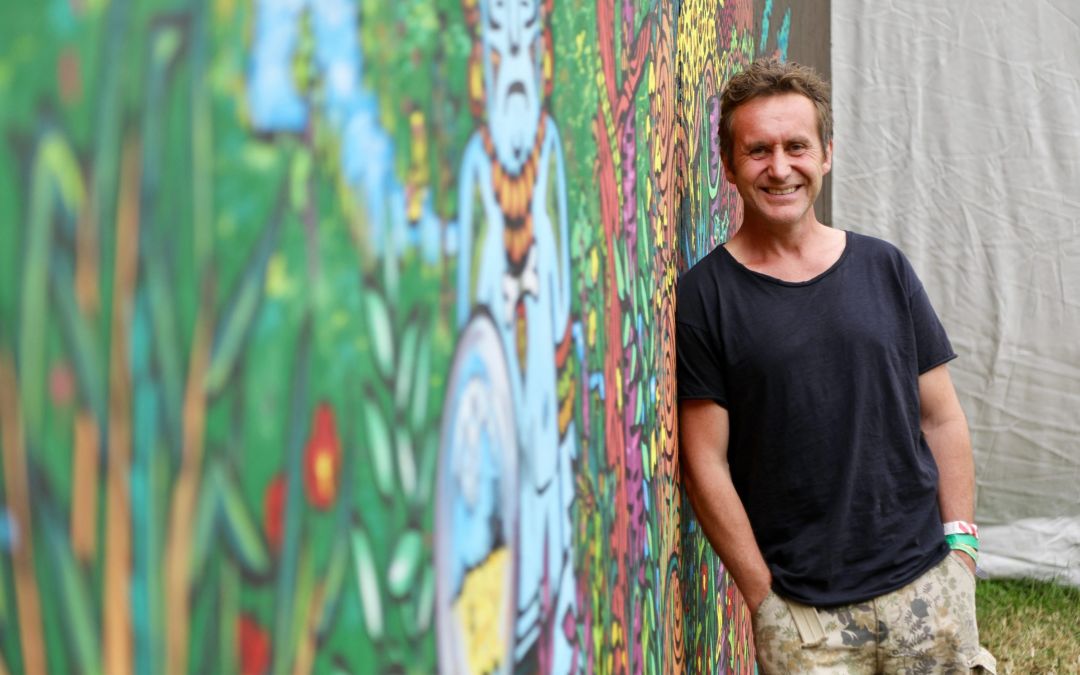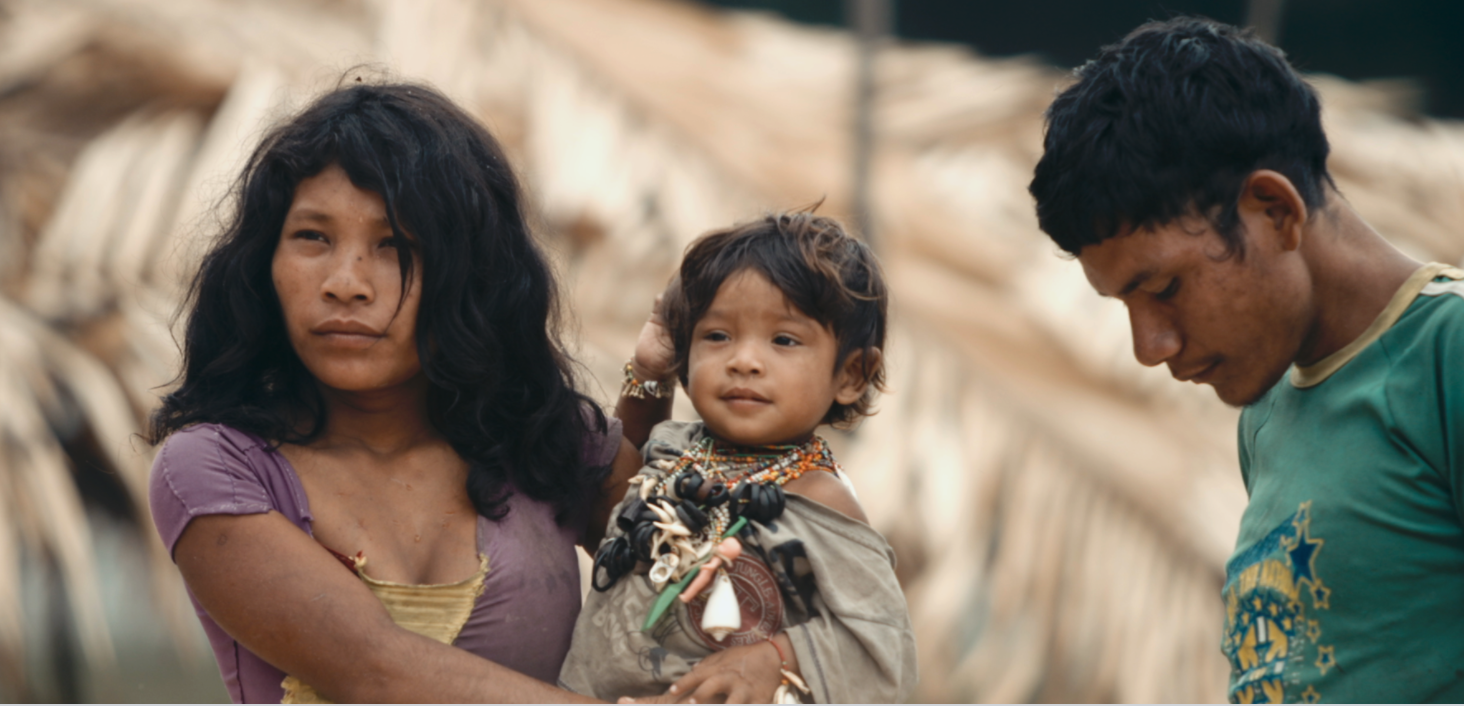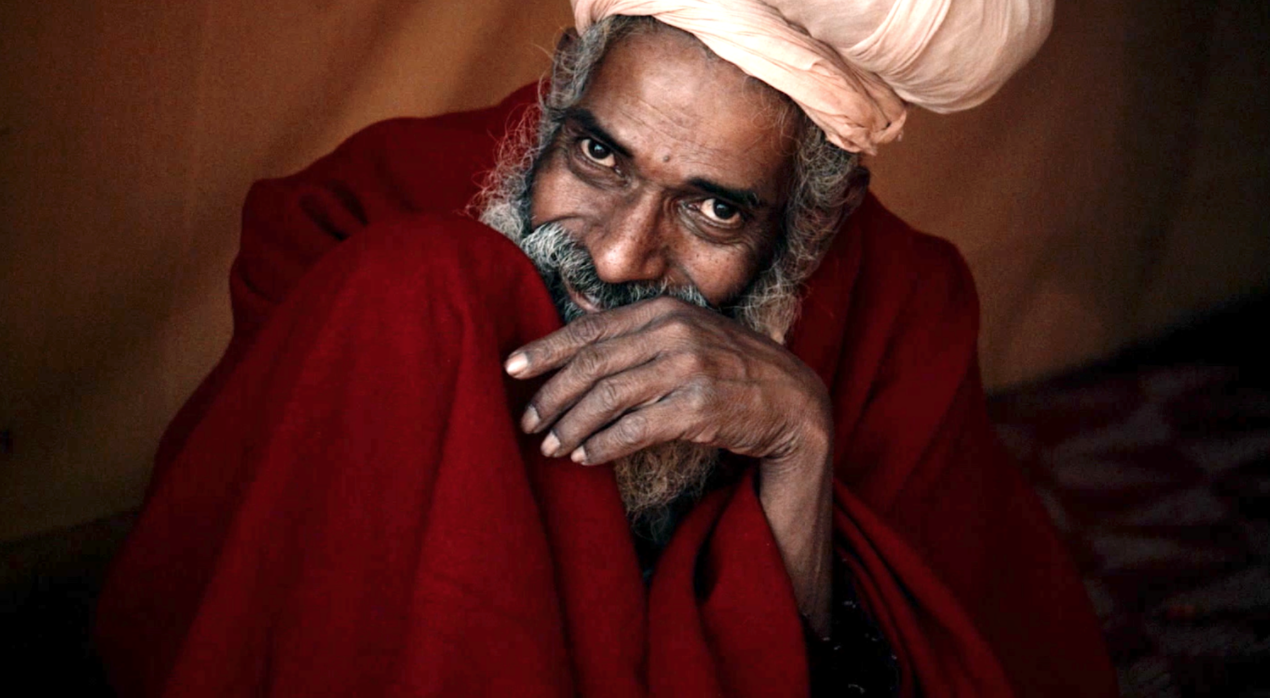Tawai: A Voice from the Forest
Paul Rushton reviews Tawai and talks with Bruce Parry

It is easy to float through Tawai as through a dream. Sweeping into the lives of two tribes; the Penan of Borneo and the Piraha of the Brazilian Amazon; to the ghats and banks of the Ganges; the hemispheres of the Earth and those of the human brain. It is liltingly poetic and powerfully experiential. It is a film of dizzying and shifting scope; expansive as the world and as local as the mind, which challenges human assumptions so ingrained within the context of our modern societies as to be blanketed under gathered dust, sleeping largely apart from modern scrutiny and debate. There is a beautiful balancing of storytelling and silence; space amongst the images to feel. Points, as Parry intended, of “less talking and more feeling,” allow our emotions and intuition to quietly converse with that which we are viewing.
Documentarian and explorer Bruce Parry, who directed the film along with Mark Ellam, returns to a community he first lived amongst whilst filming the first series of BBC’s Tribe. The Penan are nomadic, pre-agricultural hunter-gatherers of Borneo, whose profound relationship with their native forest is increasingly threatened by the encroachment of oil & logging companies; pipelines and palm oil plantations serving our modern demands. Faced with the depletion and disruption of the abundant forest and its ecosystems, they are frightened for the future and the film sees them beginning to settle and cultivate. In the larger human story, this very point; the tentative shift from millions of years living amongst nature to the dawn of agriculture around 12,000 years ago arguably marked our first exercise in mastery and precipitated our journey into hierarchical modes of living that have defined our modern age – a short passage in the full text of the human story, but a pithy one of frenzied script which has transformed the planet, our lives and our minds.

In the Penan language, Tawai describes their inner-feeling of connection to nature; that of being held by their forest as a mother holds her child. The voice from the forest is that of our ancestral selves as Parry seeks to explore changes in the human psyche since we stopped moving, hunting, gathering and living as an inextricable part of the natural world; before we set ourselves apart from, and above, both nature and one another. Despite having visited many indigenous tribes all over the world, it is in the Penan that Parry recognises our true selves:
“I was the guy who lived with tribes all over the world – it was only when I met the Penan that I realised that all the other tribes that I’d lived with, all of those TV programs that people have watched believing this is Bruce going back in time to live with these ancient people, with these ancient ways, when in actual fact – they were all incredibly modern. It was only the Penan who offered me an insight into how we really are. Every other group I lived with were all hierarchical, they had all got into the business of leadership – this group is completely different and that’s not talked about enough.”
Parry refers to psychologists and commentators like Steven Pinker; books after book portraying human nature as fundamentally aggressive and negative “without going to one group that is prior to agriculture.”
“For 90% of our time on the planet we lived like the Penan – Academic and intellectual debate isn’t taking into account the vast majority of our time – They’re all looking at recent history to draw conclusions as to who we are – why isn’t this being talked about? I think a big reason is the fact that we want to justify the fact that we feel aggression, we feel competition inside – we can’t imagine, or don’t want to imagine a society that doesn’t have that because that means I have to re-evaluate my own shit – That’s why I had to make this film.” – There are people who want to know what the possibilities are and knowing what we all once were massively shifts how the debate can go forwards – knowing that societies once shared in the way that they did; and they knew that when you bring in competition, when you bring in hoarding, when you bring in showing off, that only leads to the downfall of society. They worked incredibly hard, each and every individual to stop those things happening. That’s how we lived forever, and everyone was happier.”
It makes for compelling exploration because the Penan are not aggressive or competitive. They are loving, intimate, tactile and tranquil. Their lives are open and transparent. Through Tawai they are touchingly so with the wider world. Their lives are characterised by communality and meditative movement; harmony with their surroundings and an absence of walls; both metaphorical and actual – More and more a potent emblem of our times. It turns out that no-fences-make-good-neighbours, as Frost himself knew. Egalitarianism exists harmoniously in the forests of Borneo. Parry describes it as ‘anarchical,’ ‘with no centralised decision making at all.’ As with the Piraha, there is a tangible sense of connectivity in their portrayal, a lulling, calming ether that blurs the space between people and people; between organism and organism. “They have a belief and a feeling of something that is bigger than themselves, which is nature, and knowing that they’re part of it and not above it. [They feel] connected to it and not disassociated from it.”
Parry points to the equality the Penan enjoy as removing the conditions for “so many of the psychological – health and physical issues” arising in ‘developed’ society where we are constantly comparing ourselves to others; our circumstances, wealth, freedoms and possessions.
“There are so many tests now that show how [these issues] relate to inequality and how you feel when you’re in a society where you are seen as being less than others – It is not about being rich or poor. It is about feeling rich or poor. People might think of the Penan as poor – but they’re actually psychologically incredibly healthy – The equality means that they have less of those stresses that come about from a much more stratified society like ours.”
Parry, a gatherer himself, speaks of hunting and gathering as, “a daily form of mediation that we all once had that has shifted as we’ve shifted to agriculture.” The film captures the fullness of the sensual awareness and the extent to which the Penan are open and entirely present in these daily pursuits. It is by necessity and therefore enduring. “You can still be very attentive in an agricultural society but you don’t have to be.”
The diminishing extent to which we approach life intuitively, through the heart and the senses and allow ourselves to ‘be’ as well as ‘do’ is a prominent theme in Tawai. Parry speaks of the balance between “head and heart,” and how, having realised how “classically overstimulated” he had become, he turned to meditation and plant medicines as the two main tools to regulate this balance in his own life, as well as mindful pursuits such as foraging which allow for presence in the moment; to allay the egoistic thoughts and concerns forcing us to straddle the elsewhere at any given moment. This is the new struggle; the struggle to be here. This is worth contrasting with the Piraha. In their language there are no words indicating the past or future. Similarly, the Penan know that it is time to gather fruit when they see a particular bird in flight.

In the Piraha we see more thorough-going equality, sharing; genuine love, care and compassion. They converse with and are guided by the forest, by its voice. They talk with spirits like Kaoaibogi and believe that they would be lost without this subtle osmosis of shared resonance. In this context Kaoaibogi feels like intuition, but is appreciated as a whisper from the forest and held high over intellect; essence over ego; the whole over the individual.
Parry believes that, in various ways, communities like the Penan and the Piraha are just “carrying less trauma.” In such intimate society there is never a need to “put on a mask and pretend to be someone else”
“They have less underlying, subconscious stress towards growing old. They know that they’ll be looked after – when you die you know that you’re going to be put into the ground, and you are going to feed the trees and the plants – and those fruits from those trees will then feed the next generation. You are remembered as a member of the ancestors and part of the life going forward – Because they live in societies that are much less individualistic, much more group oriented, they don’t have that desire to be remembered in the same way that we do. We all desire to be famous – I think there is an underlying release of stress in that space, where you are not needing to be remembered – you are just part of this ecosystem that everyone’s been in forever and we’re all part of it going forwards. We just do our time and get back into it.”
Parry later gathers with a group of Sadhus at the breath-rescinding mass gathering of pilgrims by the Ganges at the Kumbh Mela in India. It is here that he feel a very visceral sense of human and natural connection; firstly in the generosity and wisdom of his companions, knowing, silent instruction and humble spiritual practice; and then in a recognition of himself in each of the people joyfully bathing in the sacred waters. There is a palpable, blissful bristle in this sense of universal consciousness, that shared by all things, which can be directly experienced. Parry suggests that this is something which we have all felt. He speaks of his own “extraordinary interconnected experiences” that were not fully acknowledged at the time:
“I’d never actually put them down to much at all other than that was just taking a drug or that was just in a football crowd. It didn’t mean anything.”
Returning to these experiences with a greater understanding of meditative and spiritual practice meant that Parry was able to un-package these experiences that he had, “put in a box,” and be “reminded of the experience in a much, much richer context.” That which our ancestors accepted and communities like the Penan and Piraha experience as actual, self-evident and everyday is perhaps simply lost to the larger noise and pace of our lives, our more divisive and individualised social ordering, or the extent to which we no longer trust experiential truths such as those imparted in the euphoric midst of a festival crowd, by staggering coincidence or quietly, in a swirling trance of grassland. As Parry says:
“Maybe there is a collective consciousness happening here and now that we just culturally ignore. We don’t have any explanation for it so we just kind of forget it – If we were to have a richer cultural explanation, scientific explanation or any story that allows it to be placed in a richer context then you can remember it in a different way. As a filmmaker it was hard to know where to put the feelings and where to put the explanations. Most people have had a feeling of connection, even if it’s a memory of childhood; being in that oceanic state when we’re very young. There is a loss of that as we grow up. If we’re able to we can even tap into that – that childhood joy, that magic. I’ve lived with tribes who use techniques using words – to bring back the magic. Even though it may be in a sense a trick, it is a trick that allows for the sense of connection to come back. It’s amazing to remember the magic of the not knowing, of the possibility.”
Parry recognises the way in which such aspects of Tawai can split the crowd. “It depends on the sensitivity of your receptors. – People see me going to the Kumbh Mela and saying I feel like I am at one with everything – we have to contextualise before those words can have any meaning – We had to play with those two ways of receiving information – Explanation and experience.”
Commentators too can appear to back away a little from such themes. Parry’s sheer friendliness can see him lazily cast as ‘well-meaning’ or his work a touch ‘New Age,’ by reviewers, without offering any explanation of these terms or why they might be viewed as a barrier to objective truth. Parry is an explorer, and this is terrain fit for greater exploration. Through Tawai he, straight-forwardly and incisively, seeks to heave the proverbial elephants from the shadowy corners of the room into the plain-sight of discussion and debate and offers a story of humanity and natural order that is anything but new. Belief in universal consciousness, for example, is very far from outlandish tree-huggery. It is as old as the hills of both the East and the West; an integral part of yogic and Ayurvedic understanding, Buddhism and branches of ancient Greek philosophy. It was well understood by visionary thinkers such as Rudolf Steiner and Albert Einstein and is beginning to be incorporated into Western neuroscientific theory. It is worthy of discussion. Parry’s central message chimes pretty harmoniously with Einstein’s assertion that:
“A human being – experiences himself, his thoughts and feelings, as something separated from the rest – a kind of optical delusion of his consciousness. This delusion is a kind of prison for us, restricting us to our personal desires and to affection for a few persons nearest us. Our task must be to free ourselves from this prison by widening our circles of compassion to embrace all living creatures and the whole of nature in its beauty.”
There is compelling insight from anthropologists Ingrid and Jerome Lewis and discussion of the processing of information by the human brain with psychologist Iain McGilchrist. Parry speaks of the Penan when hunting, “everything is experienced in its fullest [with] all of the information just flowing through” as the information streams into the right hemisphere of the brain, and likens this to the meditative state. In the context of the demands of modern living, however, this is “actually quite a hard space to be in – it’s so much information, everything is so perfect and blissful, it’s not very easy to get shit done.” The information is therefore filtered into the left hemisphere where “things are pared down and you get a map – something you can navigate.” “In that space is where we have managed to [conceive] all the amazing things that we have created. But what Iain says is that how the brain should work is that the information should then in turn be passed over, back into the right, which sees everything back in the whole, and that’s where the wisdom of knowing how to use these tools – how they should best be used [is found].”
Parry is clear that he does not have “a downer on science and technology.” He is not advocating a return to pre-agricultural times but rather credence given to our underlying ancestral understanding and the application of this wisdom. Tawai is also seeking to give renewed credibility to spiritual practices as “tools that are allowing us to reconnect to something that gives us a greater understanding of the world and that can go alongside science.” He hopes that we will honour people like the Penan and the Piraha; the remaining keepers of that love that no one remembers; appreciating their microcosm as reflecting a larger harmony and learning to “feel more deeply.” Understanding the spiritual beings we were for millions of years before our societies became extractive and competitive, before land and people were mastered, is not anathema to progress but is crucial in informing and defining a less destructive future and might tilt it from the small span of individuals it serves towards a more symbiotic whole.
“The Penan are going to go on a journey, it’s not about turning back the clock. [They] will also benefit from all the wonderful things that we have created in this world together but we have to see them in the wisdom of all of us together on this planet, because at the moment we’re not, we’re seeing through this other prism of competition and greed and hierarchy and only when we can place those wonderful tools into the wisdom of ‘the whole’ serving the whole, including us ourselves, all other species and everything on this planet; then these technologies will be amazing. It’s about emerging, and bringing all of that wonderful stuff into a wiser and wider, more universal vision and to stop seeing ourselves as central.”
Tawai – A Voice from the Forest is currently screening in select UK cinemas









